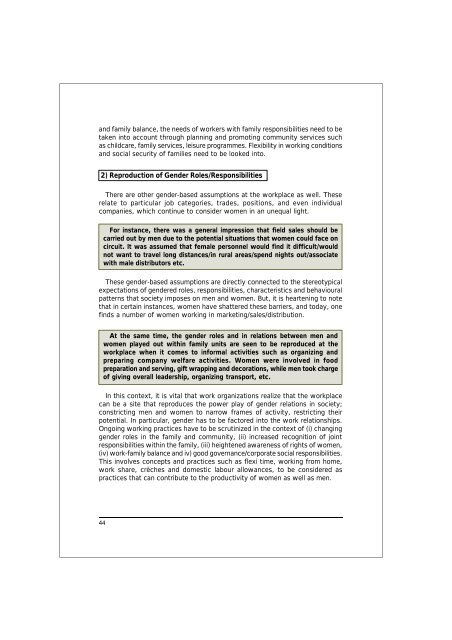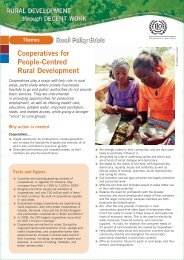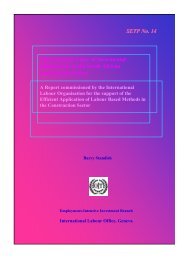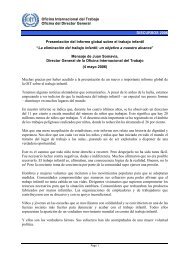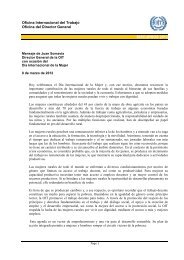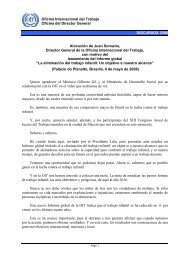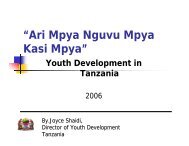Beyond Glass Ceilings and Brick Walls - International Labour ...
Beyond Glass Ceilings and Brick Walls - International Labour ...
Beyond Glass Ceilings and Brick Walls - International Labour ...
Create successful ePaper yourself
Turn your PDF publications into a flip-book with our unique Google optimized e-Paper software.
<strong>and</strong> family balance, the needs of workers with family responsibilities need to be<br />
taken into account through planning <strong>and</strong> promoting community services such<br />
as childcare, family services, leisure programmes. Flexibility in working conditions<br />
<strong>and</strong> social security of families need to be looked into.<br />
2) Reproduction of Gender Roles/Responsibilities<br />
There are other gender-based assumptions at the workplace as well. These<br />
relate to particular job categories, trades, positions, <strong>and</strong> even individual<br />
companies, which continue to consider women in an unequal light.<br />
For instance, there was a general impression that field sales should be<br />
carried out by men due to the potential situations that women could face on<br />
circuit. It was assumed that female personnel would find it difficult/would<br />
not want to travel long distances/in rural areas/spend nights out/associate<br />
with male distributors etc.<br />
These gender-based assumptions are directly connected to the stereotypical<br />
expectations of gendered roles, responsibilities, characteristics <strong>and</strong> behavioural<br />
patterns that society imposes on men <strong>and</strong> women. But, it is heartening to note<br />
that in certain instances, women have shattered these barriers, <strong>and</strong> today, one<br />
finds a number of women working in marketing/sales/distribution.<br />
At the same time, the gender roles <strong>and</strong> in relations between men <strong>and</strong><br />
women played out within family units are seen to be reproduced at the<br />
workplace when it comes to informal activities such as organizing <strong>and</strong><br />
preparing company welfare activities. Women were involved in food<br />
preparation <strong>and</strong> serving, gift wrapping <strong>and</strong> decorations, while men took charge<br />
of giving overall leadership, organizing transport, etc.<br />
In this context, it is vital that work organizations realize that the workplace<br />
can be a site that reproduces the power play of gender relations in society;<br />
constricting men <strong>and</strong> women to narrow frames of activity, restricting their<br />
potential. In particular, gender has to be factored into the work relationships.<br />
Ongoing working practices have to be scrutinized in the context of (i) changing<br />
gender roles in the family <strong>and</strong> community, (ii) increased recognition of joint<br />
responsibilities within the family, (iii) heightened awareness of rights of women,<br />
(iv) work-family balance <strong>and</strong> iv) good governance/corporate social responsibilities.<br />
This involves concepts <strong>and</strong> practices such as flexi time, working from home,<br />
work share, crèches <strong>and</strong> domestic labour allowances, to be considered as<br />
practices that can contribute to the productivity of women as well as men.<br />
44


